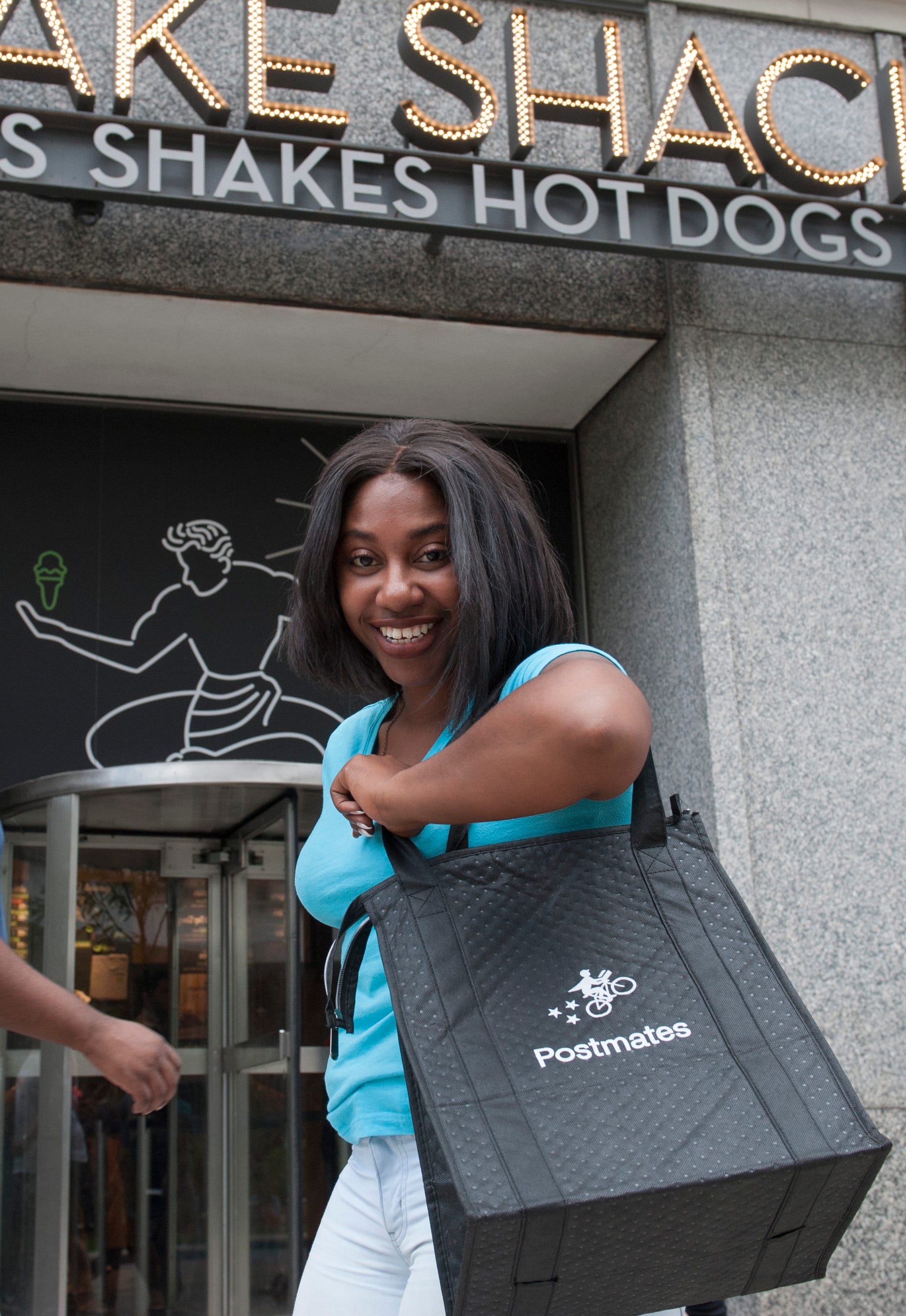Restaurant delivery apps boost sales in Detroit, bite into profits
 Breana Noble
Breana Noble
A Royal Oak resident craving some spicy buffalo wings can't go to MI Wings Co. because it doesn't have its own restaurant.
Instead, customers order from Uber Eats, the app-based restaurant delivery business powered by ride-hailing company Uber. MI Wings Co. is one of three "virtual restaurants" that have operated from Milan Pizzeria's kitchen in downtown Royal Oak since July and can only be found on the Uber Eats app. Metro Detroit has 10 virtual restaurants.
Now, sales at the pizzeria are up more than 35 percent. The restaurant is buying ingredients from its supplier five days a week instead of three and has hired two new staff members. Plus, it is exploring opening a fourth virtual restaurant for Italian food.
"We're being able to turn our restaurant into a kitchen," said Rahim Ali, a partner of Milan's Pizzeria. "Instead of me opening a new restaurant, taking on the risk, I can make a burger or wings restaurant and give customers more options."

Smartphone app-based restaurant delivery businesses are serving hundreds of restaurants and thousands of consumers every day in Detroit and its suburbs. Services such as Detroit-based Flash Delivery and Chicago’s publicly traded Grubhub have been around for years, but the city recently has seen an influx of new names. Although they may bring new customers to local restaurants, some also are causing headaches.
Uber introduced its food delivery service to Detroit in November; by August, Uber Eats had expanded into eight suburbs, including Livonia, Sterling Heights and Troy with more to come this year and next. DoorDash followed, appearing in February. And Postmates in June introduced to Ann Arbor and Detroit its service, which also delivers items from stores such as AutoZone, CVS Pharmacy and Lululemon Athletica.
“Detroit has been on our list for a long time,” said April Conyers, Postmates senior director of communications. “With all of the unique food and merchant offerings, it just was the right time to be there. It’s growing like wildfire.”
While Detroiters are seeing an explosion of easy and convenient access to favorite restaurants and stores, many restaurants said they are seeing sales increase since getting their menu on one of the apps. But eateries also said delivery from third-party companies charge gouging commission fees up to 35 percent and come with surprise orders from services with whom the restaurants say they do not partner.

“It’s like whack-a-mole,” said Greg Mudge, owner of Mudgie’s Deli & Wine Shop in Corktown. “When you get rid of one, another pops up.”
Mudgie’s provides its own delivery during the day, but it also has a contract with Grubhub to deliver meals. It’s “not paying the bills,” Mudge said, but it is nice additional business, especially during the evenings and on snowy days. Still other services, most recently Postmates, have uploaded Mudgie’s menu to its app — without permission, Mudge said — and tried to deliver to customers.
Grubhub is convenient, Mudge said, because he can turn it off when things get busy. But when another delivery app requests an order of 20 sandwiches or something that is no longer on its menu and the restaurant cannot accommodate the request, Mudge said it risks losing him a customer.
“They’re trying to bottom feed and scrape off your hard work,” Mudge said. “It causes a lot of confusion and heartache.”
Conyers said Postmates pulls menus from businesses' websites and that its staff is reaching out to restaurants to form direct partnerships with them for deliveries. She said it can take some time to reach everyone before that happens, though.
DoorDash has a reputation for this, as well. Hazim Zamann, owner of Haz Subs and Salads in Corktown, said the company reached out to partner with him, and he said he was not interested because the restaurant does its own delivery. The sub shop, however, still is an option in the app.
"For the majority of our merchants, being on DoorDash offers not only an additional influx of customers and revenue but also presents an additional marketing opportunity," Brent Seals, who leads DoorDash's launch team, said in an email. "For those not interested in being on DoorDash for any reason, we immediately remove them from the platform upon their request."
Customer fees typically depend on how far the delivery is. DoorDash offers free delivery on some nearby locations, though most orders include a 10 percent service fee. Lower fees are $1.99-2.99, though they can go as high as $12. Some DoorDash and Grubhub restaurants have minimums on orders. Postmates offers a subscription service where for $6.99 per month, customers get free delivery on orders more than $20.
On the restaurant side, the services typically negotiate with the restaurants on a per-case basis. Those who use Grubhub reported 20-25 percent commissions, while those on Uber Eats said theirs were 30-35 percent. Conyers at Postmates said it typically charges 20-30 percent.
UBS Group AG, an investment bank and financial services firm, estimated in a recent report that annual global online food ordering revenue is $35 billion and could grow to $365 billion by 2030. But in the report titled “Is the Kitchen Dead?,” analysts assessed if the growth in popularity of food delivery combined with technological improvements in meal preparation and delivery could make cooking a rare occasion — and online and app-based ordering an $815 billion per year industry.
For some people, restaurant delivery is already becoming a habit, said Carolyn Howard, co-owner of the Traffic Jam & Snug restaurant in Midtown. Traffic Jam is on DoorDash, Flash Delivery and Grubhub and has seen month over month growth from app orders.

"There is a lot of loyalty on the customer side once they get used to the procedure," Howard said. "We get the same orders repetitively. It’s almost like I know the people without having met them. I see a familiar order, and oh, it's that anonymous customer again."
After trying Uber Eats for the first time in Arizona at a hotel, Mijo Alanis, owner of Beyond Juicery + Eatery and Vivio’s Food & Spirits, knew: “It’s the future.”
“It was amazing,” Alanis said. “I ordered a dish, and then it asked if I wanted roasted Brussel sprouts, and I said, ‘Yeah, I would.’ Then it asked if I would like extra salad dressing, and I paid like $27, but it let me know about the upcharge for everything it was offering.
"I could see the car coming with my delivery. And when I went down to the lobby and went outside, I found the car, and the driver asked, ‘OK, which one’s yours?’ I asked, ‘You have more than one order from the same restaurant? To the same hotel?’ He did. That’s when I realized: This has some legs.”
Alanis’ seven restaurant locations have tripled their delivery sales since they joined DoorDash, Grubhub and Uber Eats, though Uber outperforms the other apps combined. His Eastern Market locations grew from 5-10 deliveries a day to 60.
Alanis said he does have to pay a 30-percent commission for Uber orders, and originally, he had to hire a few new staff members to manage the online orders. But now that Uber has integrated its online ordering with the restaurant’s other orders, it is more efficient. The commission, he said, replaces labor costs for the additional orders.
“I don’t see why any restaurant wouldn’t take them all on,” Alanis said. “Once we started it, it was like this is a no-brainer. You gotta have it.”
Ali Beydoun, the owner of Sicily’s Pizza and Subs in southwest Detroit, said he has little choice but to use DoorDash, Grubhub and Uber Eats.
“It’s the nature of the business now,” Beydoun said. “It’s how the consumer habits are going. People are loyal to their apps and phones, and we have to be part of that culture.”
His commissions cost around 30 percent, he said, but the base cost of meals is about 70 percent. That leaves the deliveries nearly unprofitable, which is frustrating, when the restaurant has its own delivery service that is more affordable. Beydoun said he hopes a “substantial investment” in technology to integrate the orders from all three apps will make things more efficient.
“They cannibalize,” he said. “It’s not new business. They take the consumer, the same consumer, and recycle it around.”
The most common complaint from restaurants was that sometimes delivery drivers are late. As a result, customers may get their food too cold or warm, which reflects poorly on the restaurant by word of mouth and in reviews, said Ahmad Nassar, head of operations at 75 Detroit Kitchen, a food truck in southwest Detroit that uses DoorDash, Grubhub and Uber Eats.
“Be mindful of that type of dynamic: There are two different parties that play a role," Nassar said. "It’s not necessarily the restaurant’s fault.”
Mudge of Mudgie’s said he has delivered meals himself when no driver shows, but Grubhub compensates the restaurants in those cases.
He said when Mudgie’s launched its service with Grubhub, it also had problems with customers complaining that sandwiches were missing, despite a manager checking every order. Now, the restaurant staples the bags shut, and he said it has been less of a problem.
Despite challenges, some restaurants are going all in with the apps. Sweetwater Express, Sweetwater Tavern’s carry-out locations, is one of the most popular restaurants on Uber Eats in Detroit.
Will Talley, store manager of the Southfield location, said Sweetwater joined DoorDash, Grubhub and Uber after its employees told the owner about them. The app orders have doubled sales, replaced the eatery’s own delivery service and made it add two staff members.
“It’s more efficient,” Talley said, "and customers love it because they get exactly what they want.”
bnoble@detroitnews.com
(313) 222-2429
Twitter: @BreanaCNoble